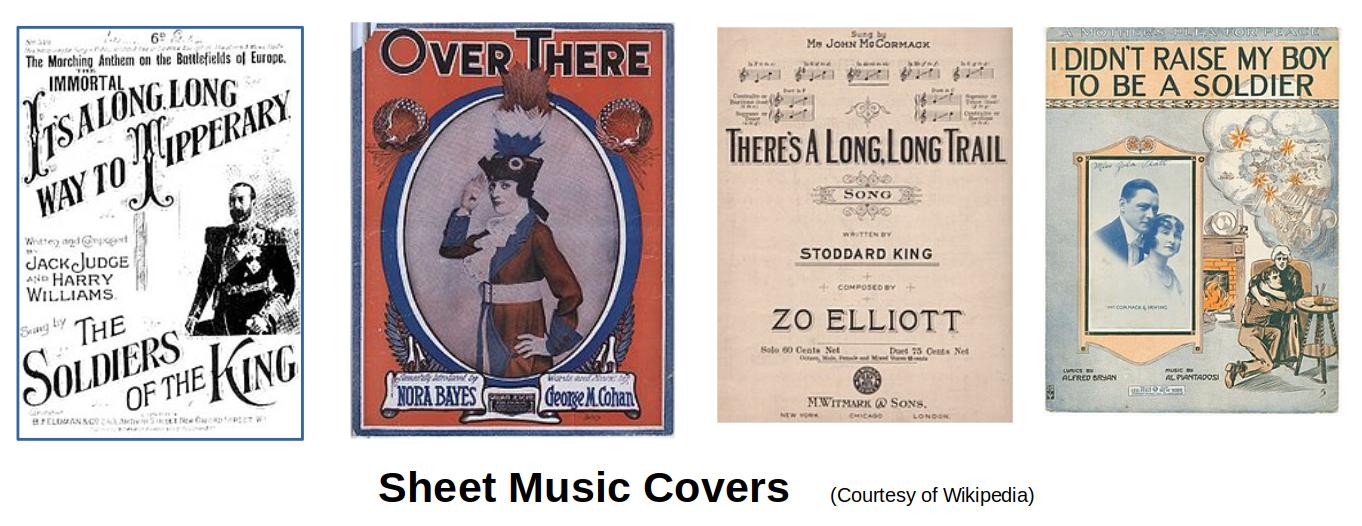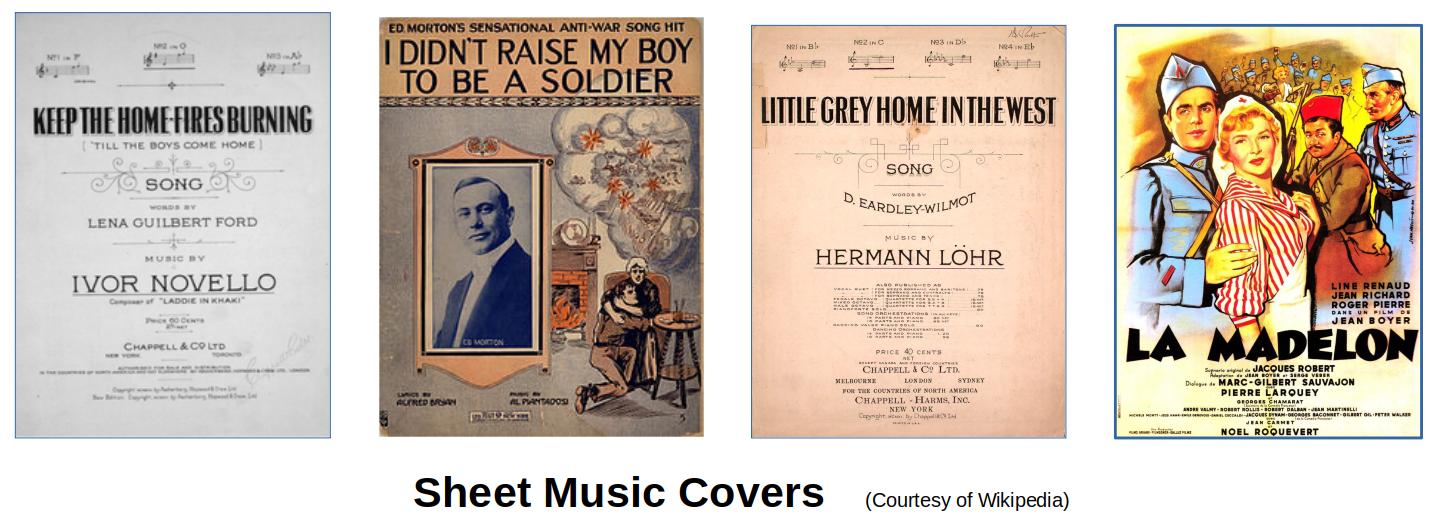Songs of the Great War
by Howard Fosdick © FolkFluteWorld.com.
What was once called the "Great War" was one of the greatest tragedies in human history. Convulsing the entire globe, what we now refer to as World War I took the lives of some ten million soldiers and an equal number of civilians.
But as is often the irony, timeless music sprang from catastrophe. This article covers some of the best-known tunes of the era. We'll give a bit of background on each.
You can freely download the sheet music for all these tunes -- and their lyrics -- here. You can play this sheet music on almost almost any folk flute. I've found the songs appropriate for any flute keyed to C, or even the D tin whistle.
While reading this article, you can click on any highlighted song title to see its sheet music.
Marching Songs
One song I'm sure you'll recognize is It's a Long Way To Tipperary (click to see the sheet music).
The song was written by Jack Judge and Harry Williams (though its authorship is sometimes disputed).
Jack Judge was a popular English music hall musician prior to the War. He first performed the song in 1912. After famed Irish tenor John McCormack recorded it in 1914, it quickly became a favorite marching song of British troops.
It's curious that the song ended up as a prominent marching tune. The words lamented a longing for County Tipperary in Ireland and a girl named Molly, rather than inspiring soldiers to brave deeds or patriotism.
Here's the chorus:
It's a long way to go.
It's a long way to Tipperary,
To the sweetest girl I know!
Goodbye, Piccadilly,
Farewell, Leicester Square!
It's a long long way to Tipperary,
But my heart's right there.
While British troops favored Tipperary, Americans preferred Over There. This song lionized the arrival of the Americans to the European war and urged its young men to the colors.
George M. Cohan penned Over There in 1917, just as the United States abandoned its isolationism and entered the war. It's noteworthy that this song also experienced some popularity in World War II some twenty-five years later.
In contrast to Tipperary, Over There is a straightforward appeal to patriotism with its repetitious first line:
The chorus continues in this vein, celebrating America's importance to the War:
Send the word, send the word over there
That the Yanks are coming, the Yanks are coming,
The drums rum-tumming everywhere.
So prepare, say a prayer,
Send the word, send the word to beware –
We'll be over, we're coming over,
And we won't come back till it's over, over there.
When Johnny Comes Marching Home is one of the best-known marching songs of all time.
Written in 1863, this tune became a popular military ditty for both sides during the American Civil War. It spawned several alternate versions including the English version, When Tommy Comes Marching Home.
Not surprising, then, that it resurfaced during the Great War as a field tune. Its upbeat, simple melody is perfect for marching cadence. The song popped up yet again during World War II as the title for both a stage play and a Hollywood film.
Patrick Gilmore wrote Johnny and its lyrics, though he acknowledged he may have heard soldiers humming a similar tune that he adapted. Gilmore allegedly wrote the song for his sister Annie, who was awaiting the safe return of her fiancé, a Union Captain.

Laments
While partiotic marching songs comprise one category of WWI songs, another group pines for the lost comforts of home. Often these focus on family or the girl left behind. Common to all is the hope for a better, more normal life after the war.
There's a Long, Long Trail developed the way many of the best songs do: as a bit of a lark. Alonzo "Zo" Elliott was a senior at Yale University in 1913. He was humming a tune he had developed when his roommate, Stoddard King walked into their shared dorm room. King suggested a first line for the lyrics, Elliott invented the second, and on they went until a complete song emerged.
The lyrics perfectly expressed the feelings of many a soldier in the subsequent War:
Days are very long;
I'm a-growing weary only
List'ning for your song...
Keep the Home Fires Burning rivaled Long Way to Tipperary in British popularity. It's a straightforward plea for those on the home front to keep living life as usual, so that when the soldiers return, they'll feel at home again.
The tune was composed in 1914 by Ivor Novello. Lyrics were added by Lena Guilbert Ford. Several singers quickly adopted the song as their own and ensured its popularity during the war.
Lyricist Ford became a war casualty. The Germans air raided her home district of Maida Vale, in London, in 1918. Given the much more intense bombing of England during the Second World War, we often forget that Germany also launched both Zeppelin and airplane raids on England in the First.
Little Grey Home in the West was another sentimental British song of the time. It was composed by Hermann Lohr with lyrics by D. Eardley-Wilmot. I first ran across the tune in The Canadian Soldiers Song Book. Released just prior to the War, it became one of its popular theme songs.
Finally, we mention the torch song of all French soldiers, Madelon. Sometimes referred to as La Madelon or Quand Madelon, it's a song about a cabaret server who jokes and joshes with the soldiers during their leave. It brings to mind happy times flirting with a pretty young lass without cares.
Camille Robert wrote the music and Louis Bousquet penned the lyrics in 1914. Like many other Great War songs, it revived in the Second World War. Marlene Dietrich famously sang it in Paris and the song subsequently popped up several times in the 1950s.

An Anti-War Song
Here's an oddity: one of the first truly popular anti-war songs in the United States. I Didn't Raise My Boy to Become a Soldier was written in collaboration between lyricist Alfred Bryan and composer Al Piantadosi. First recorded in 1914, it became a best-selling hit within a year.
The song boldly expressed anti-war sentiment in its straightforward lyrics. They're unusual enough that they're worth fully quoting here:
Ten million soldiers to the war have gone,
Who may never return again.
Ten million mothers' hearts must break
For the ones who died in vain.
Head bowed down in sorrow
In her lonely years,
I heard a mother murmur thru' her tears:
Chorus:
I didn't raise my boy to be a soldier,
I brought him up to be my pride and joy.
Who dares to place a musket on his shoulder,
To shoot some other mother's darling boy?
Let nations arbitrate their future troubles,
It's time to lay the sword and gun away.
There'd be no war today,
If mothers all would say,
"I didn't raise my boy to be a soldier."
2nd Verse:
What victory can cheer a mother's heart,
When she looks at her blighted home?
What victory can bring her back
All she cared to call her own?
Let each mother answer
In the years to be,
Remember that my boy belongs to me!
Among all America's wars, the First World War faced perhaps the greatest internal opposition. (It would only be matched by opposition to the Vietnam War a half century later). This song's lyrics expressed the feelings of many... and led directly to President Wilson's radical solution, the Sedition Act of 1918. That law outlawed free speech that cast dispersions on the government or its war effort. (It was repealed a couple years later and most of those convicted were offered clemency.)
Former President Teddy Roosevelt, belligerently in favor of America's entry into the Great War, attacked the song both for its anti-war sentiment and its apparent feminism. As Roosevelt put it,
Out in the trenches, artillery Captain and future President Harry Truman also had a rather raw reaction to the song. He suggested that women who opposed the War belonged in a harem, not the United States. (2)
Conclusion
While the generation that fought the First World War has long since passed on, the songs they sang are still recognizable to many of us a century later. That speaks to the quality of this music and it memorability.
You can download the sheet music and lyrics for all the songs we've discussed -- and many more First World War tunes -- here.
All are scored in easy keys for any folk flute. I've provided citations for sources where possible, but most of these songs have long since passed into the public domain, so I wasn't able to attribute them all.
In any case, I hope you enjoy them!
----------------------------------
Footnotes:
(1) Buchanan, Russell (July 1938). "Theodore Roosevelt and American Neutrality, 1914–1917". The American Historical Review. 43 (4): 775–790.
(2) Pelger, Martin, "Soldiers' Songs and Slang of the Great War", Osprey Publishing, New York, 2014, p. 265.